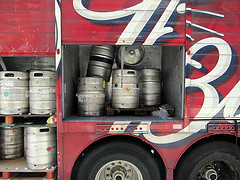Is Budweiser Really Watered Down? One Test Says Nah, Not So Much

(scoboco)
We were shocked, simply shocked at claims made in a recent lawsuit that Budweiser and other Anheuser-Busch InBev brews are watered down and as such, not as strong as their advertised alcohol content. Those allegations are based on information the plaintiffs say they procured from AB InBev workers. But how about getting some scientists on the case, just for fun?
NPR went to bat with a laboratory to determine whether Budweiser and other brews are being systematically watered down as the lawsuit claims. The brewery dismissed those allegations, saying the case had no merit.
And while many breweries do introduce water to beer batches to stretch the raw materials (in a process called “high-gravity brewing,” as NPR teaches us), does that mean the alcohol content is less than 5% alcohol by volume as stated on the beers’ labels?
NPR teamed up with a lab in San Diego to test Budweiser, Bud Light Lime, and Michelob Ultra to find out. An analytical laboratory specialist on the case says that the tests found “the alcohol percentages inside the cans were the same as what was stated on the can.”
“Some of them were spot-on. Others deviated, plus or minus, within a hundredth of a percentage” — well within federal limits, she added.
NPR shared this news with the plaintiffs’ lawyer, who dismissed the results and said as soon as he has AB InBev’s internal testing results, the case will be good to go.
As for that process of adding deaerated water to a brew, high-gravity brewing, the co-founder of a craft brewery in St. Louis, where Anheuser-Busch was born, says the company isn’t alone in that practice.
“In high-gravity brewing, you can make a lot more beer by stretching the beer that you have fermented,” he explains. “This is primarily done in very large breweries, and it works well for lighter lager beers. I would assume that all major brewers in the world high-gravity brew. It is not unique to AB.”
Budweiser May Seem Watery, But It Tests At Full Strength, Lab Says [NPR]
Want more consumer news? Visit our parent organization, Consumer Reports, for the latest on scams, recalls, and other consumer issues.

